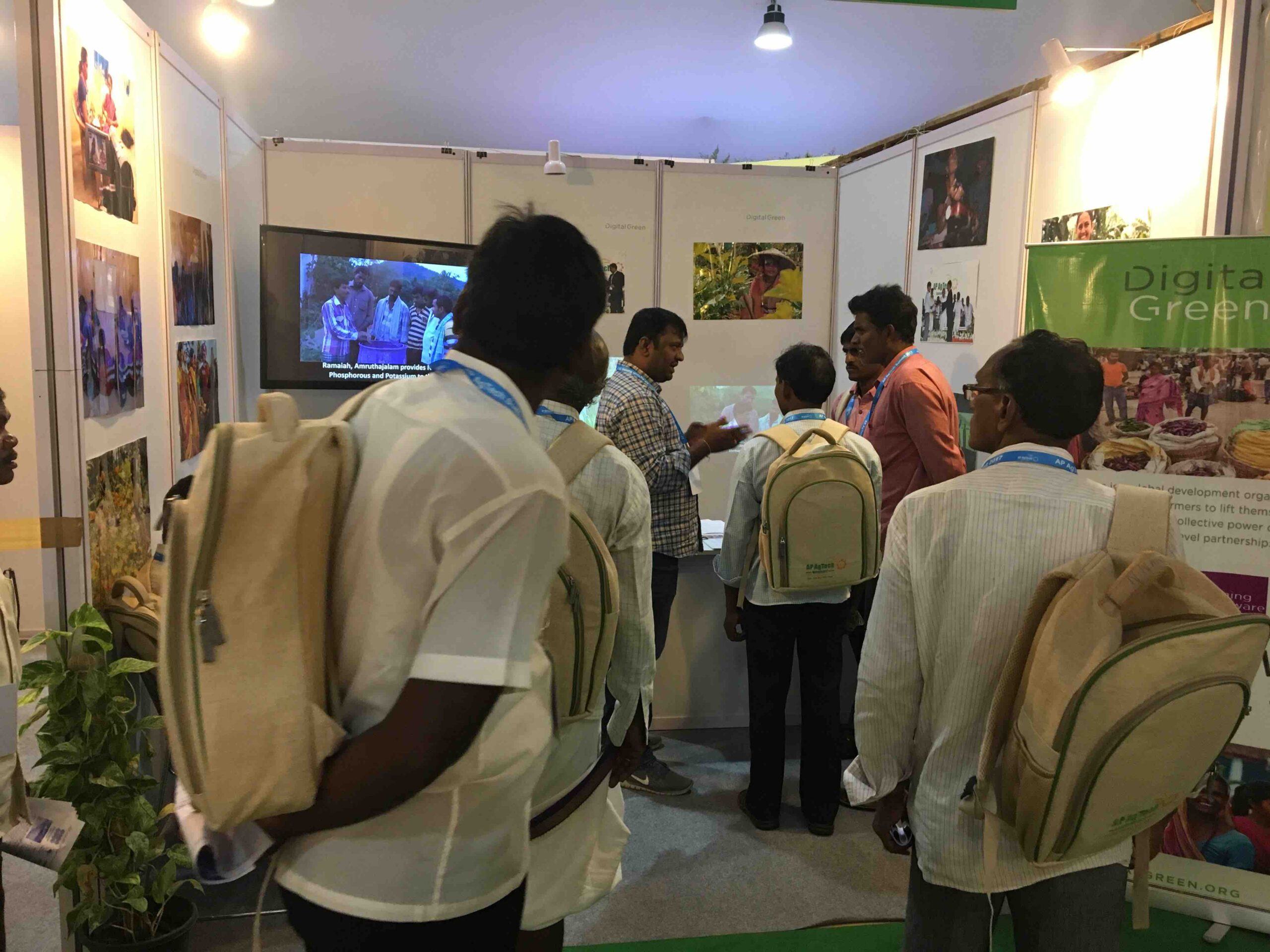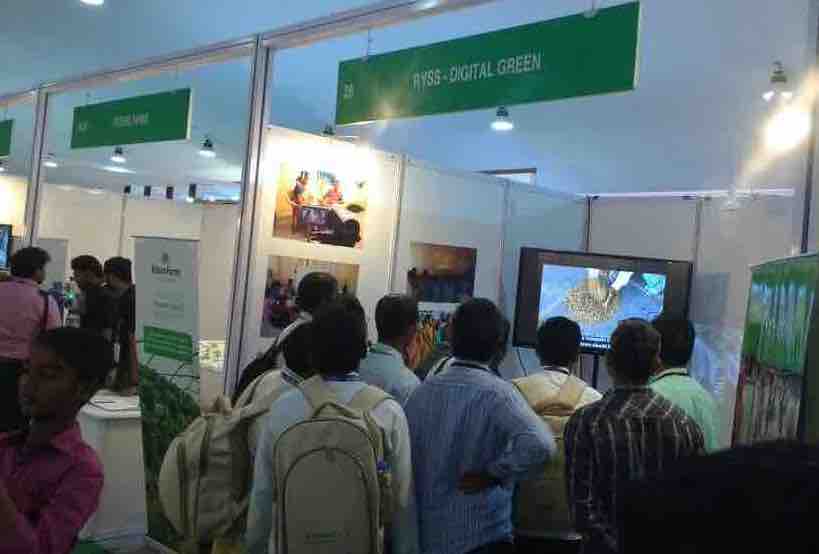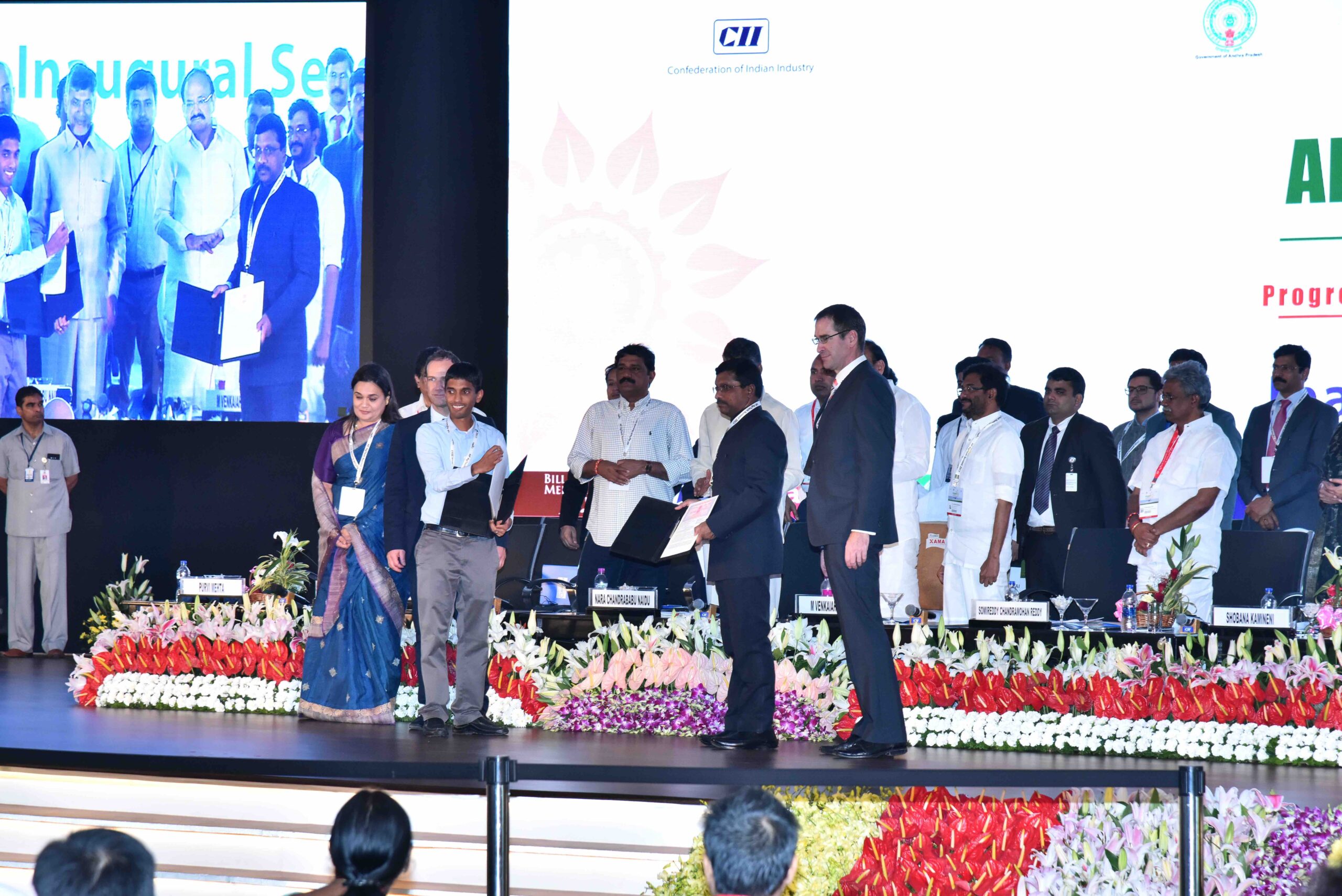To learn more about Digital Green’s AI-powered platform and how it impacts small-scale farmers in India, Ethiopia, Kenya, Nigeria and Nepal, we encourage you to sign up for our newsletter.
Eager for Video-Based Extension

Last week my colleagues and I were at the Andhra Pradesh AgTech Summit 2017 organized by Government of Andhra Pradesh, Confederation of Indian Industries(CII), Bill & Melinda Gates Foundation and Dalberg. The AgTech Summit held on 15th, 16th, & 17th November, 2017 in Vishakhapatnam brought together various agriculture technology companies from across the world to share and deliberate on the theme of “Progressive Farmer, Smart Farming”, highlighting various technologies that are currently being used or have potential to be used in agriculture – ranging from the use of drone, hydroponics, data-driven analytics to various apps and extension technologies. The audience comprised of farmers, students, scientists, policy-makers, and thought-leaders.
Digital Green was invited as a partner to the Department of Agriculture, Government of Andhra Pradesh to display our unique video-enabled extension approach at the AgriTech exhibition. Although small compared to other agri-technology companies exhibiting, the size of our stall at the exhibition was no barrier for the throngs of farmers and students who were keen to learn more about our community-based extension approach.
The humble pico projector that enables extension agents we train to share best practices in agriculture with smallholder farmers in the field played a key role in drawing an impressive footfall to our stall at this global event.
Through 2 pico projectors, we played four community videos in Telugu language, on natural farming best practices. The videos acted as a magnet, especially for farmers. One farmer would stop to view the video and another farmer would follow suit. Gradually there was a small gathering of about 10-12 farmers watching the video and they would stay to ask about the actors in the video – farmers like themselves – and about the practice showcased.
Satyanarayana, a farmer as well as a milk aggregator, from Kottakota village in Vishakhapatnam district in Andhra Pradesh, where our intervention is yet to reach, was eager to use such videos to learn best practices and apply them himself as well as motivate the nearly hundred farmers that he interacts with on a day-to-day basis.  Another farmer M.V. Subba Rao from East Godavari district has been looking for literature and relevant information on zero-budget natural farming and pointed out that Digital Green extension system will be helpful to farmers in his community. Gundra Ambayya, a smallholder farmer from V.Kothapalli village in East Godavari district requested that we transfer the videos on natural farming methods onto his mobile phone – which we did with pleasure. While watching a video on natural farming method for cultivating tomatoes, one farmer asked us “Why did they put a stick as a support for the tomato plant?” He wanted to watch more such videos on vegetable cultivation. Many Agriculture Sciences students were also fascinated by the videos and agreed that it’s a good way to reach many farmers.
Another farmer M.V. Subba Rao from East Godavari district has been looking for literature and relevant information on zero-budget natural farming and pointed out that Digital Green extension system will be helpful to farmers in his community. Gundra Ambayya, a smallholder farmer from V.Kothapalli village in East Godavari district requested that we transfer the videos on natural farming methods onto his mobile phone – which we did with pleasure. While watching a video on natural farming method for cultivating tomatoes, one farmer asked us “Why did they put a stick as a support for the tomato plant?” He wanted to watch more such videos on vegetable cultivation. Many Agriculture Sciences students were also fascinated by the videos and agreed that it’s a good way to reach many farmers.
This experience reiterated our faith in the farmer-to-farmer learning process and community-driven extension system. Our model of community-based videos supporting extension outreach is completely by the community, for the community. Since 2008, we have facilitated the production of more than 5,000 locally relevant videos in more than 50 languages. We have done this in collaboration with our grassroots partners and rural farmers themselves, allowing farmers to share knowledge with one another.
In those three days, my colleagues and I have explained the concepts of our video-enabled extension approach, many times over to the teeming farmers and delegates.
Farmers, students, and Summit delegates were keen to know when Digital Green services would reach their villages, whether we have an app to access these videos and if there are crop specific natural farming videos and whether they could watch these videos on their mobile phones. They wanted to know if we could share the phone number of the farmers featured in the videos and if we could train them on video production and dissemination. On reflecting I’m struck by the tremendous urgency in our farmers to learn about new methods and technologies to improve their practice. The farming community, in general, is vexed with current production systems in which input cost is higher than the value they realize from the output, leaving them disoriented with their occupation as a farmer – despite the hard work and dedication. Farmers are desperately looking for more sustainable production systems. This is where extension services become most crucial. The curiosity among farmers as seen in our interaction at the exhibition stall point to the fact that farmers are also demanding better extension services. On that note, We believe, strengthening extension systems is an essential first step in addressing the crisis in agriculture.
We are proud to share here that Digital Green has been working in Andhra Pradesh since before bifurcation of the state and since November 2015 we’ve been working in all 13 districts with the Department of Ag Govt. of AP.
Our partnership got a shot in the arm with the signing of a tripartite Memorandum of Understanding (MoU) between Rikin Gandhi, Executive Director, Digital Green and B.Rajashekar, IAS, Special Chief Secretary, Govt of AP and Hari Jawaharlal (IAS), CEO, Rythu Sadhikara Samstha & Commissioner – Dept of Agriculture, Govt of AP for the new BMGF supported Digital Innovations Project in the state. The project was launched formally on the 15th of November, 2017 in the presence of the Honourable Vice President Muppavarapu Venkaiah Naidu, Honourable Chief Minister, Nara Chandrababu Naidu & Minister for Agriculture (Govt. of AP), Somireddy Chandramohan Reddy.
(Additional inputs from Pritam Nanda, T.Surender & V.Kamalakar)